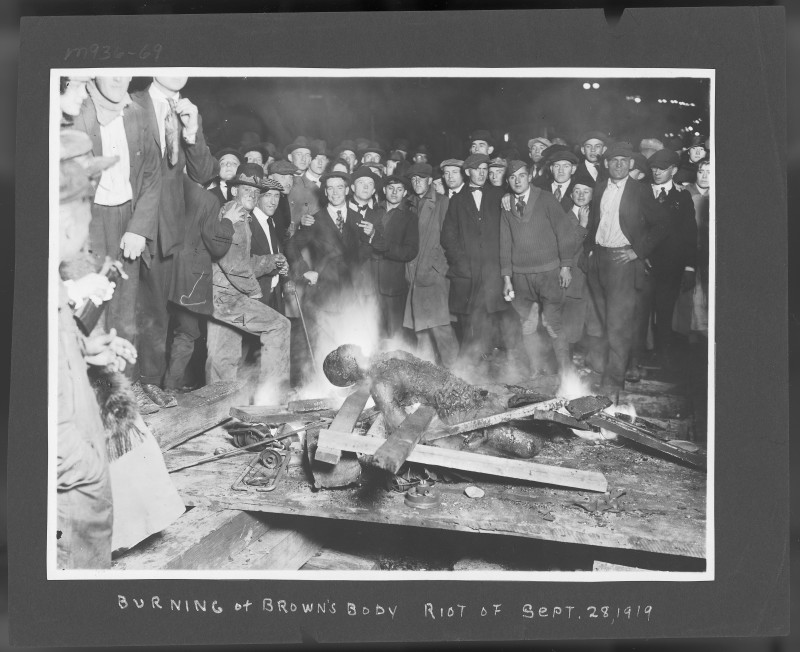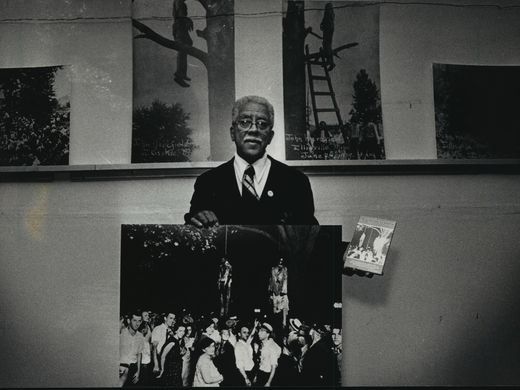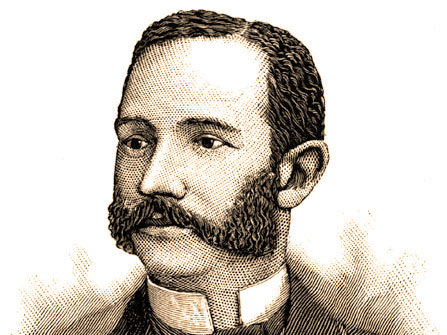Posts Tagged ‘Lynching’
Accepting Rights Award, Colin Kaepernick Decries ‘Lawful Lynching’
By The Associated Press AMSTERDAM — Amnesty International gave the former N.F.L. quarterback Colin Kaepernick its Ambassador of Conscience Award on Saturday for his kneeling protest of racial injustice, which began a sports movement and might have cost him his job. Eric Reid, one of Kaepernick’s former San Francisco 49ers teammates, presented him with the…
Read MoreTrailblazing America’s Black Holocaust Museum poised to reopen
By Mary Louise Schumacher, Milwaukee Journal Sentinel Near the end of his presidency, Barack Obama stood in front of one of the most spectacular museums ever erected on the National Mall and spoke about embracing hard truths. “Yes, a clear-eyed view of history can make us uncomfortable,” he said at the opening of the Smithsonian National Museum…
Read MoreA Short Video History of the Long History of Terror Lynchings
This exhibit features a video along with many links to resources that can help you better understand the phenomenon of lynchings. The video give a brief but very complete explanation of how and why racial terror lynchings took place and how they set the stage for current racial injustices.
Read MoreLige Daniels
On August 3, 1920, the body of Lige Daniels, an African-American teenager, hung in the main square of Center, a small town near the border between Texas and Louisiana. The image of Lige on the cover of a lynching pictorial, Without Sanctuary, has received world-wide notoriety since first published by two white Atlantans, James Allen and John Littlefield. These lynching photographs were often made into postcards and sold as souvenirs to the crowds in attendance.
Read MoreMy First Visit to ABHM
A Milwaukee man treasures his visit to the earliest (1988) version of ABHM, his talk with founder James Cameron, and the book signed by Cameron to him with love.
Read MoreGoogle Launches ‘Lynching In America’ Project Exploring Country’s Violent Racial History
Google does the unthinkable and creates a project dedicated to the history of lynchings in America. Read all about it here.
Read MoreMS Rep. Karl Oliver issues statement on “lynching” post he made on Facebook
A state representative in Mississippi calls for lynching the leadership in New Orleans that sanctioned the removal of Confederate memorials to white supremacists.
Read MoreCeremony Of Remembrance Commemorates Brutal Lynching One Hundred Years Ago
A racially diverse group of citizens of Memphis TN holds a ceremony and erects a marker memorializing the very brutal lynching of Ell Persons exactly one century ago.
Read MoreHow Does a City Choose to Remember its Past?
Many Milwaukeeans are familiar with the 1854 abolitionist rescue of Joshua Glover, an African American who escaped slavery and found sanctuary in Wisconsin. Far fewer know about the horrific racial lynching of George Marshall Clark, a free black man, that happened only seven years later in Milwaukee. What was their story, and how have we remembered these two men?
Read MoreGeorge Marshall Clark
George Marshall Clark was 22 years old when he was murdered. He had been a barber, a trade he learned from his father, George Sr., who ran his business on Wisconsin Avenue. Clark resided with his friend, James Shelton, near 5th and State Streets. Shelton and Clark were arrested together, but Shelton escaped being dragged…
Read More

